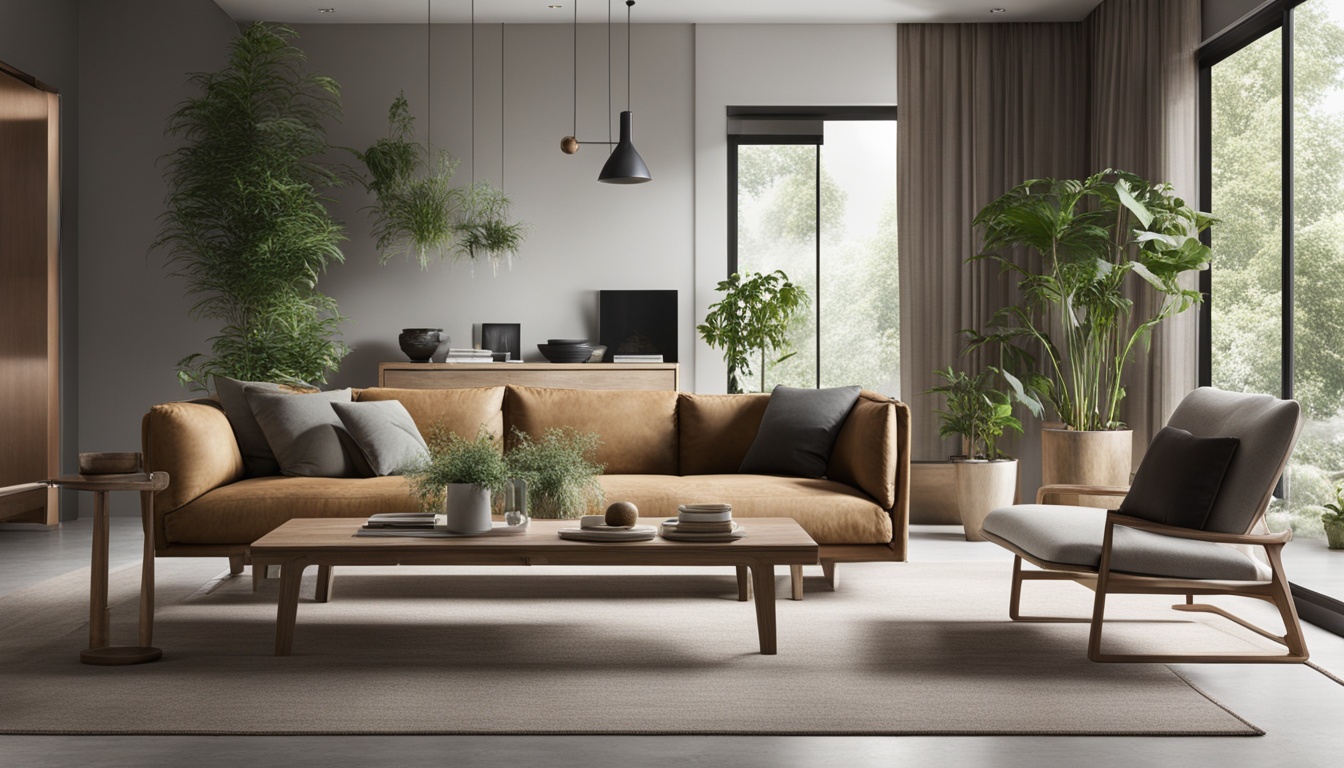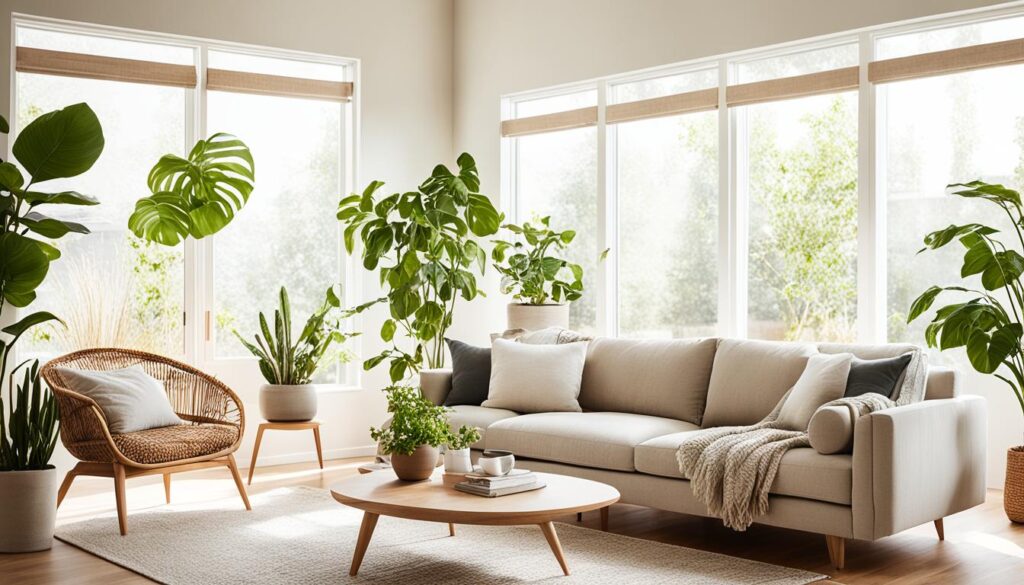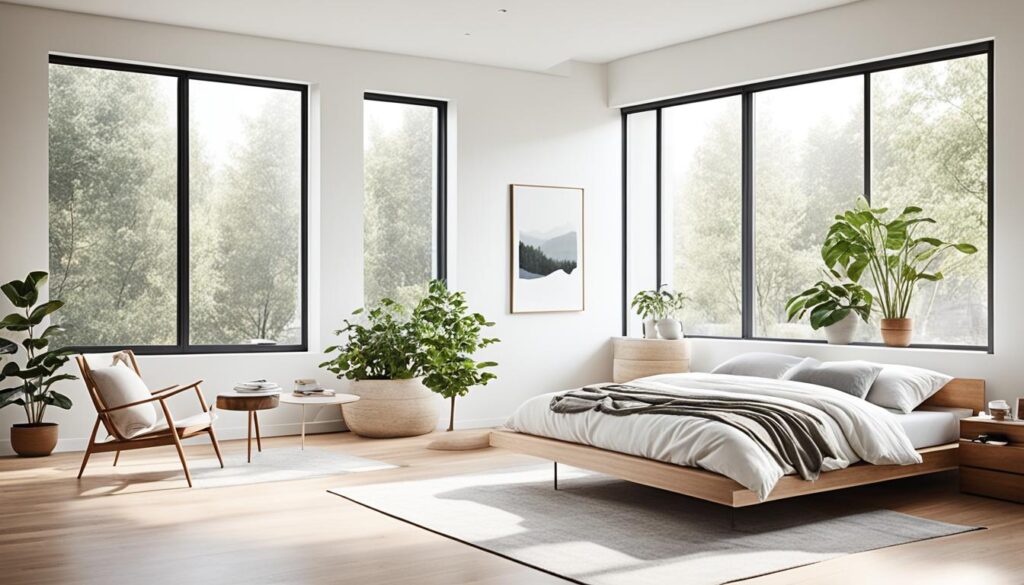Physical Address
304 North Cardinal St.
Dorchester Center, MA 02124
Physical Address
304 North Cardinal St.
Dorchester Center, MA 02124

Embrace a life of minimalism and sustainability - discover the joy in simplicity. Live consciously, reduce waste, and cherish life's simple pleasures.
Look around—our world is often filled with stuff we don’t need. It makes me crave something simpler. Today, it feels like we’re always chasing the latest things and trends. But what if there’s another path to happiness? What if joy lies not in more things, but in the simple pleasures of every day?
That’s the idea behind minimalism, which is becoming more popular. It’s not just about having fewer belongings. It’s about picking the things that are truly important and letting the rest go. This lifestyle fosters focus, simplicity, and a strong link with our world. And the cool thing? Minimalism and supporting our planet go hand in hand.
Exploring minimalism shows us a path to personal growth and a greener planet. By decluttering and being mindful of what we buy, we can change our relationship with our environment. It’s a change that makes a difference and lasts.
Let’s journey together see how choosing less can bring more joy and freedom. A life with fewer things can be more satisfying, better for the earth, and mindful.
Minimalism is a way of thinking that focuses on making intentional choices. It shows that having too much stuff doesn’t make us happy. It’s about figuring out what’s important and removing what’s not, be it things or feelings.
This way of living encourages people to tidy up their living space. It also means being more aware of the moment. Plus, it includes choosing what we buy and keep wisely.
Minimalism is rooted in the idea of simplicity. It teaches us to find joy in today and what truly matters. This is instead of always wanting more stuff or chasing happiness through things.
Choosing to live this way allows for meaningful moments and finding happiness in small things. This brings peace and a clearer focus.
Living a minimalist lifestyle has many pluses. It can lower stress, boost productivity, and bring better money sense. It can also mean stronger bonds with others and less harm to the planet.
Getting rid of what we don’t need can give us time for our top goals. It makes room for spending time with friends and family. And it can help make the world a better place for years to come.
Starting a minimalist lifestyle often starts with clearing out. You look at each thing you own. Ask yourself if it brings you real happiness. Marie Kondo’s method of keeping only what sparks joy is very popular. Minimalists also keep a small, but favorite, set of clothes.
Minimalism means more than just owning less. It’s about being fully present. This helps cut down on stress. It makes people feel better and notice life’s small joys. Activities like meditating, writing, and stepping back from screens can boost this.
Cleaning out and living in the moment brings big rewards. You’ll feel less stressed and happier. By removing both stuff and worries, life gets simpler. This lets minimalists enjoy the little things more every day.

Embracing minimalism means finding freedom in letting go of physical clutter. When we have fewer things around us, we feel freer. We don’t need to keep organizing our stuff. This sense of freedom makes our minds clearer, lowers our stress, and helps us focus on what’s important.
Minimalism isn’t just about our things, it’s also about how we manage our digital spaces. Simplifying our online life cuts down distractions and boosts efficiency. We can organize our emails better, handle our digital files, and use less social media and electronic devices.
Minimalism also involves managing our time wisely. It’s about choosing to do things that matter most to us and saying no to what doesn’t. This approach helps cut stress, improves our work-life balance, and focuses our time on the things and people we love.
Minimalism and sustainability work well together. They urge people to make thoughtful choices. A minimalist lifestyle helps reduce the environmental impact, moving towards a sustainable future. It includes buying with care, choosing durable items, and using eco-friendly practices daily.
The mix of minimalism and sustainability brings happiness and fulfillment. People enjoy the simple life and feel good about helping the planet.
| Environmental Impact | Productivity and Focus |
|---|---|
| Studies show that adopting a minimalist lifestyle can result in a 28% decrease in household waste production. | Individuals who declutter their workspaces experience a 25% increase in task completion rates. |
| Consumers practicing minimalism are 50% more likely to opt for eco-friendly products and packaging. | Simplifying daily routines has been linked to a 30% decrease in decision fatigue among minimalist practitioners. |
| Emotional Well-being | Relationships and Experiences |
|---|---|
| A survey revealed that 70% of minimalists reported a significant reduction in stress levels and anxiety. | Research indicates that minimalists spend an average of 20% more time engaging in social activities with friends and family. |
| Meditation frequency increased by 40% among those living in clutter-free environments. | Minimalism enthusiasts allocate 15% more of their budget to travel and experiential pursuits compared to non-minimalists. |
Starting a journey in minimalism and sustainability is rewarding but also hard. Some find it tough to let go of things they love. About 60% struggle with this part.
Then, there are the pressures of society’s focus on buying things. This can challenge 45% of those into minimalism. They say it’s a big obstacle.

Minimalism greatly affects well-being, bringing improved focus and increased productivity. By cutting out both physical and mental clutter, minimalists can focus more on what’s important. This lowers decision fatigue, boosting their focus and ability to solve problems. It also helps them use their time and resources more effectively.
Living as a minimalist increases mental clarity by 20%. This is due to having a clear, organized space that helps with goal setting. Such a setting improves focus and productivity, aiding in professional and personal life success.
Minimalism not only boosts focus but also cuts down on stress and decision fatigue. It simplifies life and removes distractions, creating a tranquil feeling. This makes people handle stress better and ensures an improved emotional well-being.
Minimalists enjoy a 30% drop in stress due to owning less and committing to fewer things. It significantly affects their emotion well-being and how they view life quality.
| Benefit | Percentage Increase/Decrease |
|---|---|
| Mental Clarity | 20% increase |
| Stress Reduction | 30% decrease |
| Financial Freedom | 15% increase |
| Overall Well-being | 25% improvement |
| Environmental Footprint | 10% reduction |
Choosing a minimalist lifestyle brings several benefits that greatly improve well-being. This includes better focus and productivity and less stress and decision fatigue. It values mindful living, leading to more satisfaction and stronger emotional health.
https://www.youtube.com/watch?v=Cr6VxHSw6fQ
Minimalism is a lifestyle that fights our desire to own more than necessary. It asks us to think before we buy. People who choose minimalism often pick quality over quantity. They may buy products that are well-made and last a long time. This is instead of buying things that are cheap but break easily.
Minimalists buy fewer things, focusing on what adds value to their lives. This is especially true in fashion. They might have a small, high-quality wardrobe. It’s full of clothes that are well-made. These clothes match well, letting them create many outfits.

| Metric | Value |
|---|---|
| Individuals who embrace minimalism reporting reduced stress levels | 63% |
| People who adopt a minimalist lifestyle saving money by avoiding unnecessary purchases | 46% |
| Individuals feeling that minimalism has helped them enhance their overall well-being | 78% |
| Reduction in environmental footprint attributed to those practicing conscious consumption | 55% |
| Increase in reported mental clarity and focus among individuals who declutter their living spaces | 37% |
| Individuals feeling more content and grateful after embracing minimalism | 82% |
Minimalism is about focusing on connections and experiences, not just things. By choosing to own less, people have more time and money for what really matters. They can spend more time with their friends, family, and those in their community. This makes life more fulfilling and joyful.
They find happiness in good relationships and the experiences they share. They know that happiness doesn’t come from buying more things. Instead, joy comes from building strong relationships and valuing experiences. This helps them stand tall against social pressures to show off with material possessions.
Choosing to live with less can deeply affect someone’s happiness. Minimalists have more time for the relationships important to them. This brings a stronger sense of community support and joy. Being focused on experiences brings a greater love for the now. It also helps create lasting memories from adventures, trips, and times spent with loved ones.

Minimalism and sustainability are closely linked. Following minimalist principles like mindful buying and cutting waste helps the planet. A minimalist lifestyle lets people lower their ecological footprint. They do this by buying less, throwing away less, and picking eco-friendly options. This means choosing long-lasting, green products, backing ethical brands, and using recycling and responsible disposal methods.
Sustainable living means doing things like reusing items, composting, and eating locally grown/produced foods. It also involves lowering energy use and sticking to sustainable practices. These steps cut down on greenhouse gas emissions, playing a part in fighting climate change. By living sustainably, people can shrink their carbon footprint, getting closer to a more eco-friendly lifestyle.
Minimalism is great for the earth by shrinking an individual’s ecological footprint. By buying less and picking what you use wisely, minimalists lower how much they use and toss. This means a smaller carbon footprint and less pressure on the planet’s resources. It equals a more sustainable life that protects the earth for those ahead of us.
| Sustainable Living Practices | Environmental Benefits |
|---|---|
| Recycling and Composting | Reduces waste sent to landfills and incinerators, conserving natural resources. |
| Using Reusable Products | Decreases plastic waste in landfills and oceans, promoting a circular economy. |
| Reducing Energy Consumption | Lowers greenhouse gas emissions and dependence on fossil fuels. |
| Consuming Locally Grown/Produced Foods | Reduces the energy needed for transportation and distribution, lowering the carbon footprint. |
Living minimally and sustainably makes a big difference in caring for our planet. The blend of minimalism and sustainability guides us to live a more conscious and eco-friendly life.
It’s not easy to switch to a minimalist lifestyle. Letting go of sentimental stuff can be very hard. Many people find it tough to give up things that mean a lot to them. But, to really become a minimalist, it’s important to look at these sentimental attachments closely. We must realize what these items truly mean and let go of those that no longer fit our lives.
Choosing a minimalist lifestyle can also lead to external pressures. Our society often pushes for buying and owning more things. It’s like we’re told to always want new stuff. Dealing with these expectations and stepping into change can take time. To stay true to being a minimalist, one might have to say no to certain activities. It’s crucial to set personal limits and find friends who support this new way of living.
Embracing minimalism means choosing quality over quantity. It’s about focusing on what really matters and letting go of the rest. This choice leads to a more fulfilling life. By living with less, we find freedom and happiness. Minimalism is also good for the planet, as it reduces waste.
Choosing a minimalist lifestyle is to opt for a life of less clutter. It’s not always easy, but making this change is rewarding. It means valuing experiences and relationships over things. This shift also helps the environment by cutting down on waste.
Taking the journey towards minimalism and sustainability is challenging but worth it. It encourages personal growth and helps save the planet. The benefits are more than personal; they are global.